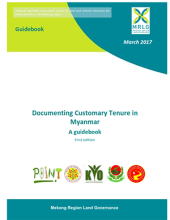Land Library Search
Through our robust search engine, you can search for any item of the over 73,000 highly curated resources in the Land Library.
If you would like to find an overview of what is possible, feel free to peruse the Search Guide.
/ library resources
Showing items 1 through 9 of 24.Presents a framework for tackling urban-rural land challenges. Designed to help a range of stakeholders in developing countries understand how to adopt an inclusive approach to land management and administration initiatives to produce a balance in urban and rural development.
This guidebook provides conceptual, legal and practical tools and resources to help civil society organizations guide communities through the process of documenting customary tenure at the local level.
Despite progressive provisions on gender equality in Tanzania’s land laws, women have little representation in land allocation decisions. Mainstreaming gender in local regulations can help address this problem.
The Lao tea sector is small in the global context but has significant potential to grow and further contribute to the local economies of tea production areas in the north and south of Lao PDR.
Large-scale agricultural investments impact upon men and women in different ways, yet women’s voices and interests are not always heard in decisions about land.
Protected area management is threatened by weak articulation between the goals for conservation, national development and local livelihoods. This discussion note examines the competing interests for lands inside Cambodian Protected Areas and makes suggestions for policy considerations.
Covers why do we need to think about policies to formalise land rights in developing countries?; primarily a political issue; policies to formalise land rights are not a panacea; inclusive formalisation policies present considerable challenges.
The Guiding Principles are designed to help a number of stakeholders develop larger-scale agricultural investments that are more likely to prove sustainable, beneficial, and successful for communities, investors and governments.
Contains 6 chapters: introduction, accountability issues in urban land management, transparency and accountability in communal land management, corruption and land reform programmes, accountability issues in large scale land deals, gender, youths and land corruption.




